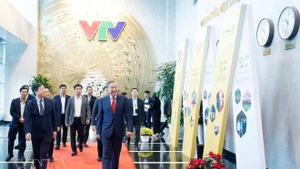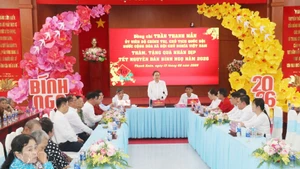Governance capacity therefore competes not only by action or vision, but also by the ability to use data to act accurately and promptly, for the benefit of the people and the development of the country.
In the traditional governance model, governance is often associated with administrative orders and experience, but in the digital age, leadership capacity is also measured by the ability to make decisions based on data, evidence and social feedback. The shift from experiential leadership to data-driven leadership is a step forward in modern governance thinking - where “political acumen” is supported by “digital intelligence”.
Modern management thinking
In reality, the ability to lead with data requires not only knowing how to “give orders”, but also knowing how to “read data” to operate flexibly; not only “listening to reports”, but also knowing how to “listen to society” through real-time information systems; not only “reacting” to reality, but also proactively forecasting, shaping and leading reality. This is not unfamiliar to the ideological foundation of the Party. President Ho Chi Minh once advised: A leader is someone who knows how to learn from the people, understand the people, and act for the people. That thought represents a modern management philosophy from very early on: a leader is not only a “commander”, but also a “servant”, “creator”, “continuously learning” from reality and the people. In the data age, Uncle Ho’s lesson of “learning from the people, asking the people, understanding the people” becomes more relevant.
The document of the 13th National Congress of the Party continued to affirm the orientation for developing the leadership team in the new period: “Developing a team of cadres, especially strategic-level cadres, with sufficient qualities, capacity and prestige, equal to the task; having strong political will, intelligence, capacity for innovation and creativity, daring to think, daring to do, daring to take responsibility for the common interest.” This is the inheritance of Ho Chi Minh’s thought in the new context - when leadership intelligence is not only the ability to “see far, think big”, but also the ability to learn quickly, adapt flexibly and operate creatively in a digital and data-driven environment.
In the era of digital transformation, leadership intelligence is not the replacement of humans with machines, but the harmonious combination of data science, social intelligence and human values. Data becomes the “blood” of modern governance, where every number, every social response, every stream of information contributes to shaping policy, is a tool to deepen intelligence and responsibility for the people and the country. If e-Government is the first step in the journey of digitizing the apparatus, then Digital Government and Data Government are at a higher level - where data becomes the basis for decision-making, a strategic resource of the country.
In Viet Nam, this transformation process is clearly institutionalized through national programs and projects. The National Data Centre System, the VNeID platform and the National Population Database have created the country's first “digital map” - allowing management agencies to connect, share and exploit data in a unified manner.
As of August 2025, VNeID - the national electronic identification application integrated from the National Population Database has been connected to 15 ministries, branches, 1 state-owned enterprise and 34 localities, and has received more than 2.1 billion information lookups and verifications, of which more than 1.2 billion were successfully processed. Typically, in Ha Noi, medical examination and treatment facilities have connected and synchronised more than 4 million people's health records to the national database through VNeID, helping people only need to bring phones with VNeID installed instead of health insurance cards and citizen identification cards. This is not just a technical reform, but a revolution in the way of operating public policies: from processing records, managing residents, to building social security, health, and education policies can all be based on real-time and actual data.
Practice in pioneering localities such as Quang Ninh, Ho Chi Minh City, and Da Nang shows the great potential of the “digital government” model in improving operational efficiency. Quang Ninh has operated the “Intelligent Operation Centre” to help provincial leaders instantly monitor the socio-economic situation and people's feedback, thereby making quick, accurate, and transparent decisions. Ho Chi Minh City develops an “open data ecosystem” to serve businesses and people, while Da Nang continues to affirm its position as a “smart city” with a two-way interactive digital governance model between the government and citizens. These examples show that when data is exploited in the right direction, leadership and management capacity can become more flexible, intelligent and humane than ever. When policies are built and announced based on evidence-based, transparent and accessible data, people not only listen but also believe, understand and accompany.
Vision and challenges
Digital transformation is not just a technological process, but a revolution in national leadership and governance thinking. In the context of the global transition to the data era, Viet Nam clearly identifies the need to fundamentally innovate its governance model - from a state that manages to become a state that creates, acts and serves based on digital platforms. This is not just a technical orientation, but a strategic vision of a country that is powered by digital intelligence and a culture of learning leadership.
The development goal by 2045 - becoming a developed, high-income country - sets new requirements for Viet Nam’s leadership team: They must be people who “continuously learn, adapt and innovate”, know how to make decisions based on data, but still maintain the humanistic foundation of the socialist regime. “Leadership in digital transformation” is not only measured by the ability to use technology, but also by the ability to transform data into policies, and transform information into people’s trust.
However, along with opportunities, the digital age also poses many great challenges to national governance requirements. Data can be collected quickly, but the ability to read, understand, analyze and use data to make policies is limited. Meanwhile, people increasingly demand transparency, efficiency and accountability. If this gap is not narrowed, no matter how much data there is, it will not become a leadership force, but only a directionless “sea of information”. In addition, Viet Nam is deploying national databases on population, land, enterprises, social security, etc.
However, the dispersion between ministries, branches and localities is still a major barrier to interconnected governance. The establishment of the National Data Centre and a legal framework for public data sharing is a step in the right direction, but requires a close coordination mechanism and strict information discipline. Balancing data power and citizens' privacy is also a challenge that needs to be addressed. In the era of open data, personal information becomes a valuable resource, and at the same time the most sensitive area. If data is abused, social trust will be damaged, and digital governance will lose its core human values. Therefore, along with the rule of law, data ethics needs to become a guiding principle in all management activities.
Maintaining human identity in digital governance is also a big challenge. Digital leaders must not only know how to “read data”, but also “understand the people’s hearts” - knowing how to listen to people’s emotions, expectations and concerns in cyberspace. That is the way to make data not become a tool of control, but a means of creating happiness and human development.
To realise the vision of a modern national governance system, created and operated on a data platform, Viet Nam needs a comprehensive, fundamental and long-term reform roadmap, focusing on building a leadership team with digital capacity, data intelligence and innovation spirit. The formation of a team of “data civil servants” - people who are not only proficient in technology, but also knowledgeable about governance, public ethics and evidence-based decision-making methods - is an urgent requirement. They must be officials who are able to read, analyze and use data scientifically; know how to exploit technology to serve the people, not be led by technology. The selection and assessment of officials must be based on their ability to perform in the digital environment: the ability to process information, make quick decisions, coordinate across sectors and ensure transparency in action.
Leadership and strategic advisory bodies also need to be equipped with a system of data analysis tools, simulation models and real-time socio-economic forecasts. The use of artificial intelligence (AI), big data and open analysis platforms will help the State forecast risks early, accurately assess policy impacts, thereby being proactive in managing and preventing crises. The project on strengthening national risk forecasting and management capacity deployed in 2025 is a vivid demonstration of this direction - when Viet Nam begins to shift from “consequence management” to “proactive risk management”. National governance in the digital transformation era is therefore not only a matter of technocratic capacity, but also the combined intelligence of the rule of law, humanity and innovation. That is the foundation for Viet Nam to move closer to the goal of a rule-of-law State, where every leadership decision is guided by objective data and a heart for the people. In the data era, national governance thinking cannot stop at empirical management, but must be based on evidence and knowledge. The fundamental transformation lies in: from “management leadership” to “data-creating leadership” - that is, leaders not only make decisions, but also create data ecosystems, foster trust and promote innovation throughout society.
In the data era, national governance thinking cannot stop at empirical management, but must be based on evidence and knowledge. The fundamental transformation lies in: from “management leadership” to “data-creating leadership” - that is, leaders not only make decisions, but also create data ecosystems, foster trust and promote innovation throughout society.
As the Party's 13th Congress Document clearly stated: “Strongly develop digital government, digital economy, digital society associated with the process of renewing the growth model, restructuring the economy and building a modern, effective and efficient national governance”. That requires a new leadership apparatus - people who have a deep understanding of technology, are knowledgeable about data, but above all have a humanistic vision, know how to use data to serve people and develop sustainably. Leadership intelligence, in that context, becomes the “soft energy” of the modern rule-of-law State - where the leader not only operates with administrative power, but also with the ability to create, connect and spread values.
















